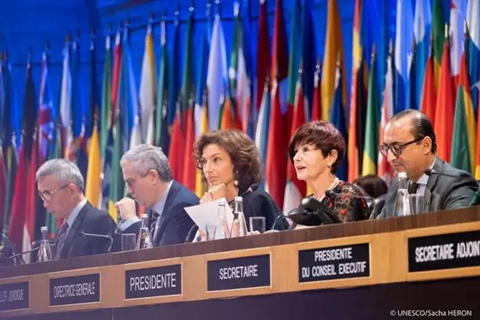
GCED Basic Search Form
Quick Search
You are here
News

21 November 2023 Last update: 27 November 2023
On 20 November 2023, the 194 UNESCO Member States adopted the Recommendation on Education for Peace, Human Rights and Sustainable Development at UNESCO's General Conference. This is the only global standard-setting instrument that lays out how education should be used to bring about lasting peace and foster human development through 14 guiding principles.
The Recommendation is unique in bringing together all dimensions of education and linking different thematic areas, from digital technologies and climate change to gender issues and fundamental freedoms. The newly adopted text updates the "1974" Recommendation that almost 50 years ago united Member States in positioning education as a key driver of peace and international understanding. For the past two years, UNESCO has been revising this visionary tool to ensure it responds to today's greatest challenges and future shocks.
"Today, when crises polarize our societies, when the multipolar world order continues to be the scene of violent conflicts, education must more than ever remain a defensive bulwark against the fractures of the world and a foundation for lasting peace,” said UNESCO Director-General Audrey Azoulay. “It is this same conviction that continues to drive UNESCO's action.”
Helping to build more peaceful, just, equal, equitable, inclusive, democratic, healthy, and sustainable societies, the Recommendation will become a tool for all education stakeholders to achieve the Sustainable Development Goals.
A vision of education for humanity and peace
The Recommendation acknowledges that peace is built not only through international negotiations, but also on school benches, in school yards and sports fields, through arts and science education, and throughout life. Education in all its forms and dimensions, in and out of schools, shapes how we see the world and treat others, and it can, and should, be a pathway to constructing lasting peace. To realize these ambitions, the new text outlines what exactly needs to change in approaches to education and how. It defines 14 guiding principles which should shape the transformation of education systems in the decades to come.
The revised text, a product of the broad consensus reached by Member States earlier this summer, was the first item discussed at the Education Commission. 194 UNESCO Member States unanimously agreed to recommend it for adoption by the 42nd session of the UNESCO General Conference. Close to forty countries took the floor to express their unwavering support for the updated Recommendation. They also praised the inclusive and participatory revision process, which created a climate of trust between countries and allowed them to finally adopt the text by consensus.
"Our world needs a message of peace now more than ever. Education can nurture connections between people. In our current context, we cannot miss this opportunity to state loud and clear that – here at UNESCO – Member States agree on a vision of education serving humanity and peace. With the dedication and hard work of country delegations, we managed to shape the text into a document…that every Member State can call its own," said Prof. Charles Bosire, permanent delegate of Kenya to UNESCO and Chair of the Bureau in charge of the Revision of the 1974 Recommendation.
While Member States will be responsible for its application at the national level, UNESCO will support their implementation processes and undertake regular reporting on their efforts.
What is unique about the revised Recommendation?
-
It strongly emphasizes human rights and fundamental freedoms and integrates issues deemed central to achieving lasting peace in our era, such as sustainable development, climate change, respect for diversity, gender equality, and media and information literacy.
-
It outlines 14 guiding principles, concrete learning outcomes and priority action areas for holistically reshaping all aspects of education systems, from laws and policies to curricula development, teaching practices, learning environments and assessment. For example, it highlights that beyond critical literacy and numeracy skills, learners should acquire competencies like empathy, critical thinking, intercultural understanding and environmental stewardship.
-
It covers educational activities in all settings and at all levels, and throughout life, connecting the dots between areas that have not been previously considered together. For example, the nexus between learners' physical and mental health and their ability to access and attain education, the impact of climate change on the education system, as well as knowledge gained outside the classroom.
-
It can be used by all education stakeholders – from policy-makers and teachers to informal educators and tradition-bearers – as a baseline to transform their policies, practices and approaches to build empathetic and inclusive learners. For example, using this document, teachers can see how to adapt their lesson plans to integrate specific topics and activities, or local community leaders can advocate for specific changes in policies and curricula.
-
It brings education with the times, considering how the world has changed and will continue to evolve in the decades to come. For example, it takes into account contemporary phenomena like growing online hate speech and outlines what can be done through education to foster learners' resilience.
